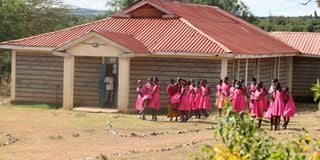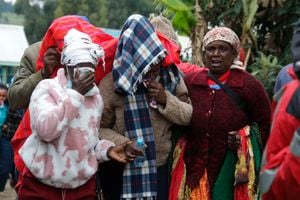How we overcame FGM, early marriage to triumph in KCPE

Some of the students at Samburu Girls Foundation in Samburu County. The girls survived FGM and forced marriages to post exemplary performance in this year's KCPE.
What you need to know:
- Jacinta Lerte* who was ‘prepared’ for marriage at the age of 10, sailed through pain, stigma, physical and psychological torture to score 376 marks in KCPE.
- Dorcus Kanipa* unsuccessfully sought refuge at her relatives’ homes to escape the cut and early marriage. She scored 347 marks in KCPE.
- Ruth Naserian* who scored 332 marks, underwent the cut and her parents planned to send her to her husband the next day but she was rescued by an NGO.
The scars and determination of Jacinta Lerte* are evident as she narrates the distressful ordeals she has endured to get out of the shackles of cultural bondage.
The 15-year old Samburu girl is celebrating her exemplary performance in the recently released Kenya Certificate of Primary Education (KCPE) results.
Despite her ordeals, she scored 376 marks out of possible 500. Lerte has become a proud champion for change. She sailed through pain, stigma, physical and psychological torture to attain these marks.
Little did she imagine she would ever be free from psychological bondage and pain inflicted on her when she was subjected to female genital mutilation (FGM).
Born and raised in a rural village in Samburu County, Lerte was ‘prepared’ for marriage at a tender age of 10, in line with the norms of her community.
Among the Samburu, who are semi-nomadic pastoralists, the FGM practice culminates in child marriage. It takes place when a girl is believed to have reached a “marriageable” age. This is what Lerte experienced when she was only 10 years. She was married off to a middle-aged man "almost the age of my father” against her will.
“My parents had ordered the marriage because they wanted the goats and cattle that could come as my bride price,” she recounts.
Child marriages and FGM are illegal in Kenya, yet about 21 per cent of women aged 15-49 have undergone the vices according to the United Nations.
In Lerte's case, things took a fortunate turn after the police and a non-governmental organisation, the Samburu Girls Foundation (SGF) intervened. She was rescued and taken to the SGF centre at Loosuk area in Samburu West.
"I have walked a rough path where my parents and relatives disowned me because I refused to bring them wealth (dowry). I, however, thank God and the Samburu Girls Foundation family for what I have achieved. I will continue to push forward," Lerte tells Nation.Africa in an interview.
With her 376 marks, she hopes to join her dream school - Pangani Girls High School in Nairobi. She wants to inspire more Samburu girls who are still tied by the outdated cultural practices such as FGM, beading and early marriages.
Inspire more people
"I want to be a doctor. I chose this profession and will choose it over and over because I want to inspire more people in the rural villages," she says.
“I hope to start such an initiative (SGF) in future and I will work with other survivors to end the practices that once left my life in disarray,” she adds.
Lerte is not alone at the centre. Her friend Dorcus Kanipa* narrates how she unsuccessfully sought refuge at her relatives’ homes (manyattas) to escape the cut and early marriage. The 15-year-old's school life was cut short when she was in Class Five at a rural school in Samburu Central.
Kanipa’s parents had resolved to marry her off at the age of nine.
“They planned it and kept it a secret. They dragged me out of school immediately and perpetrated the heinous acts,” Kanipa recounts, tears rolling down her cheeks.
"I did not know they had even agreed on the amount of dowry to be paid; I was forced and when I remember, it hurts me to date."
She sat her KCPE and scored 347 marks out of possible 500. Like Lerte, she also wants to be a doctor in future. She hopes to get a chance to study at her dream school; State House Girls High School in Nairobi.
“For a long time I was mentally disturbed and the ordeals are not going away. I have forgiven everybody who collaborated to have me married off. I am now focused on my studies. I want to go back and empower my community and family after I am done with school,” she says.
Ruth Naserian*, who was initially unaware of the marriage plans, reveals her dowry negotiations began immediately she got home for the April holidays.
Realise her dream
“I had to undergo the cut before getting married. They had planned to send me to his home the day after the cut,” Naserian says, revealing that she was rescued the next day and taken to the SGF where she has stayed since. She scored 332 marks.
Naserian hopes to join St Irene School in Maralal to realise her dream of becoming a doctor.
About 11 survivors of FGM at the Samburu Girls Foundation wrote their 2020 KCPE exams this year.
Samburu Girls Foundation centre manager Mercy Titus hails the girls' exemplary performance and in them, she sees resilient women in the Samburu community.
She tells Nation.Africa that most women in the Samburu community have no say and await orders from elders who cannot be opposed because it is considered taboo. She says SGF will continue to provide psychosocial support to the FGM victims within and without Samburu County, noting that the organisation is currently supporting more than 463 girls.
"We often cater for everything, especially psychosocial support because most of them have been mentally tortured. When we realise the ground is safe at their homes, we reintegrate them with their families because we do not want to break the family bonds. However, we keep monitoring them," says Ms Titus.
SGF Executive Director Dr Josephine Kulea says many young Samburu girls have suffered in the hands of greedy parents who want to enrich themselves by selling off their daughters.
Girls as young as eight years are forced to undergo the cut far away from the glare of the public and law enforcement agents, an exercise that was initially conducted openly amid traditional and colourful celebrations.
Opinion shapers
However, Dr Kulea is optimistic that the deeply rooted cultural practice will soon come to an end as the government banks on the elders, largely the opinion shapers in the society.
She points out the infamous Kisima anti-FGM Declaration that was officiated by President Uhuru Kenyatta as a game changer “because elders vowed to end the practice”.
“It was like a win for us because we have been facing opposition whenever we rescue girls. Those who want the vice to continue often made our rescue mission difficult, but we are relieved by the Kisima declarations,” Dr Kulea says.
On March 5, Samburu elders signed declaration forms to support the anti-FGM campaign in Samburu County. The forms contained clauses that spelt doom to anyone who undertakes the vice.
The declarations also cemented other retrogressive cultural practices including early marriages, rape and teen pregnancies and emphasised equal treatment of boys and girls in education.
Child marriage and FGM are human rights violations, widely banned around the world, yet millions of girls continue to face them. Globally, one in every five girls is married before age 18, and it is estimated that some 200 million girls and women alive today have experienced FGM, according to the United Nations.





